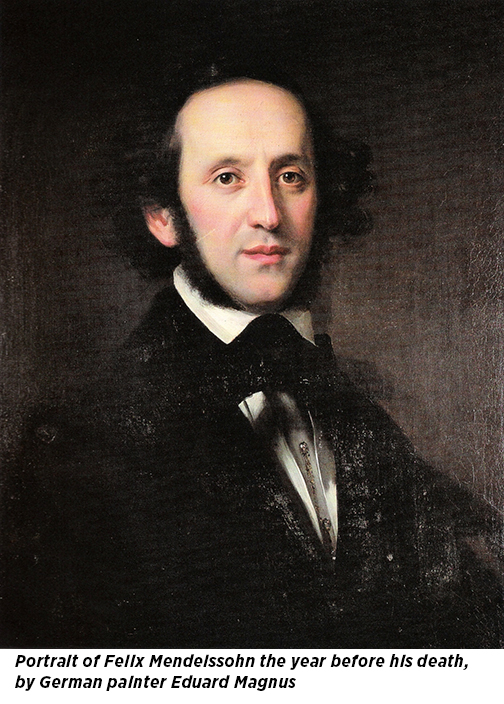Composed 1847; 25 minutes
 The F minor Quartet by Felix Mendelssohn opens and closes with anything but a smile. Intense and urgent, its agitated tremolo opening is punctuated only by the suspended agonies of the first violin, often poignantly poised high above the other three strings. The F minor Quartet is ‘late period’ Mendelssohn. Highly subjective music, it strains at the constraints of the medium of the string quartet itself.
The F minor Quartet by Felix Mendelssohn opens and closes with anything but a smile. Intense and urgent, its agitated tremolo opening is punctuated only by the suspended agonies of the first violin, often poignantly poised high above the other three strings. The F minor Quartet is ‘late period’ Mendelssohn. Highly subjective music, it strains at the constraints of the medium of the string quartet itself.
In May 1847, Mendelssohn was devastated to hear of the death of his 41-year-old sister Fanny, a sister with whom he had maintained a close and productive relationship since childhood. She collapsed while rehearsing her brother’s music. Mendelssohn became so distraught that he was unable to attend her funeral. His wife Cécile arranged for him to take the waters at Baden-Baden. His insomnia continued. “I force myself to be industrious, in the hope that later on I may feel like working and enjoying it,” he wrote in July to his younger sister Rebecca. By September, the F minor Quartet was complete.
Structurally, Mendelssohn looks back to the classical sonata form of Beethoven in his middle-period. In each of the four movements, his attention is focused on emotion and passion, underpinned by a recurring thematic use of the notes of the F minor home key. By the end of the opening movement, after an increasingly intense coda, the anger and inner fury of the music has not abated. The second movement, a sardonic, angry scherzo, remains in the dark key of F minor. Its biting harmonies are prescient of the scherzos of Mahler. Economy of means is again a hallmark in the slow movement and little respite is offered. The restlessness of the opening movement returns in the finale. Again, Mendelssohn works with fragments and motifs rather than full-blown melodies. The anguish and drive continue relentlessly to the end.
A few weeks after he completed the quartet, on October 3, 1847, Mendelssohn wrote: “Now I must gradually begin to put my life and my work together again, with the awareness that Fanny is no longer here; and it leaves such a bitter taste that I still cannot see my way clearly or find any peace.” Mendelssohn himself was to die just one month later after a series of strokes, November 4, 1847, at the age of 38.
— All program notes copyright © 2023 Keith Horner. Comments welcomed: khnotes@sympatico.ca